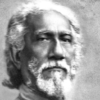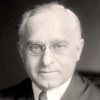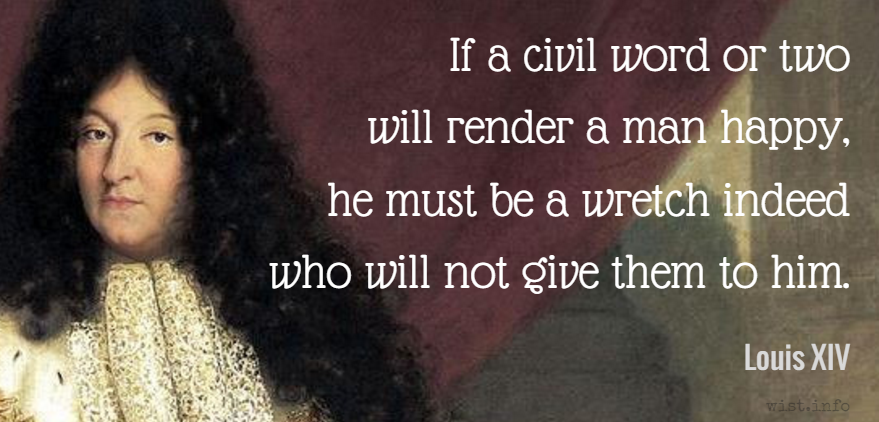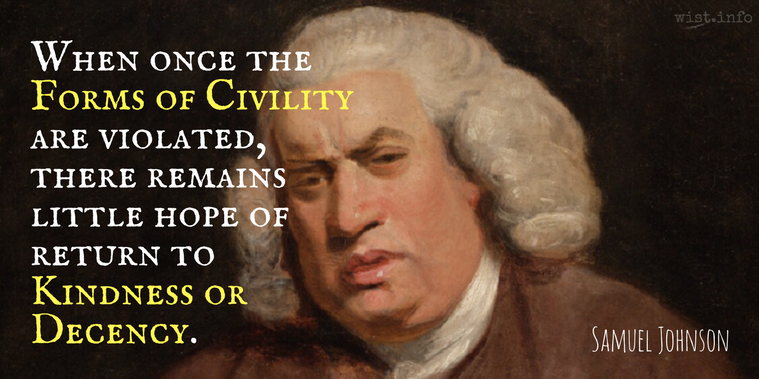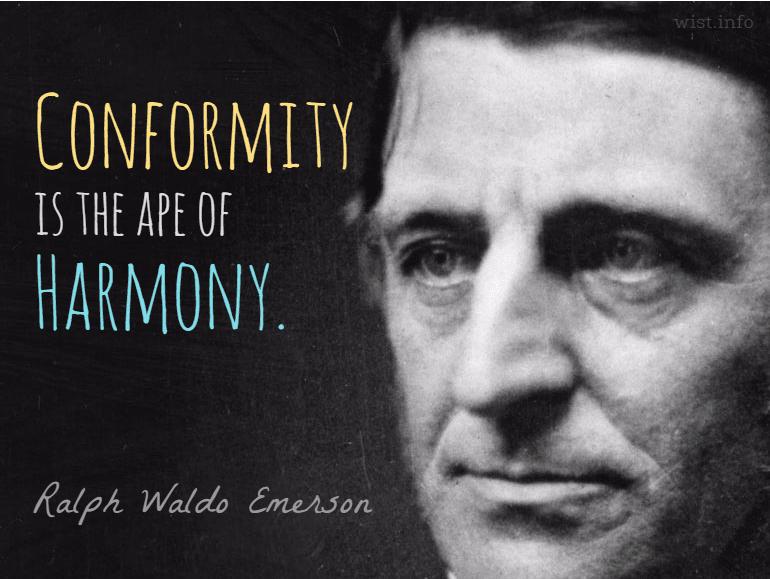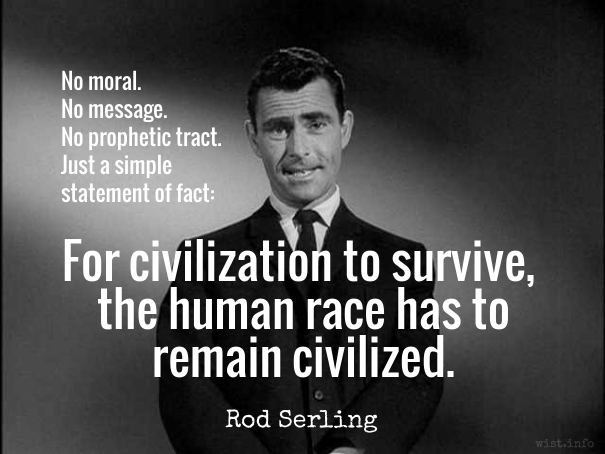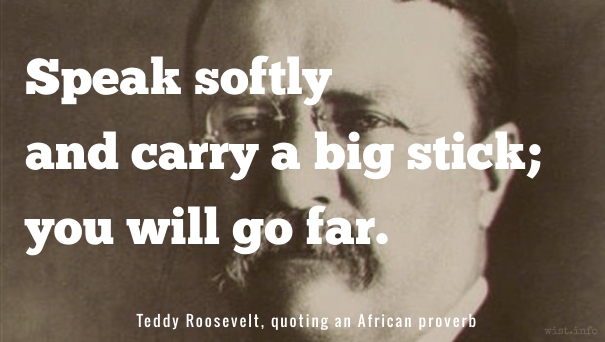CONGRATULATION, n. The civility of envy.
Ambrose Bierce (1842-1914?) American writer and journalist
“Congratulation,” The Cynic’s Word Book (1906)
(Source)
Included in The Devil's Dictionary (1911). Originally published in the "Devil's Dictionary" column in the San Francisco Wasp (1881-08-12).
Quotations about:
civility
Note not all quotations have been tagged, so Search may find additional quotes on this topic.
It is because gold is rare that gilding has been invented, which, without having its solidity, has all its brilliance. — Thus, to replace the kindness we lack, we have devised politeness, which has all its appearance.
[C’est parce que l’or est rare que l’on a inventé la dorure, qui, sans en avoir la solidité, en a tout le brillant. Ainsi, pour remplacer la bonté qui nous manque, nous avons imaginé la politesse, qui en a toutes les apparences.]
Pierre-Marc-Gaston de Lévis (1764-1830) French noble, politician, author, aphorist
Maximes et Essais sur Différents Sujets, “Pensées Détachées,” # 180 (1808)
(Source)
(Source (French)). Frequently misattributed to his more famous father, Francis de Gaston, first Duke de Lévis.
The full aphorism also includes a final clause, "et au défaut de vertu, nous avons l'honneur, qui en a l'éclat" ("and, in default of virtue, we have honor, which has its luster").
The French was incorporated in standard French grammar books for many years.
The English translation shows up in several cases without any attribution and in varied contexts (1, 2, 3).
The object of what we call deportment and good manners is to attain that which can otherwise be attained only by force or not even by force.
[Durch das, was wir Betragen und gute Sitten nennen, soll das erreicht werden, was außerdem nur durch Gewalt, oder auch nicht einmal durch Gewalt zur erreichen ist.]
Johann Wolfgang von Goethe (1749-1832) German poet, statesman, scientist
Elective Affinities [Die Wahlverwandtschaften], Part 2, ch. 5, “From Ottilie’s Journal [Aus Ottiliens Tagebuche]” (1809) [tr. Hollingdale (1971)]
(Source)
(Source (German)). Alternate translation:That which we call politeness and good breeding effects what otherwise can only be obtained by violence, or not even that.
[Niles ed. (1872)]
Good manners without sincerity are like a beautiful dead lady.
Sri Yukteswar Giri (1855-1936) Indian monk, yogi, guru [श्रीयुक्तेश्वर गिरि, b. Priya Nath Karar]
In Paramahansa Yogananda, Autobiography of a Yogi, ch. 12 (1946)
(Source)
For tho’ it is certainly more laudable, and a thing of greater moment, to be generous, constant, and magnanimous, than merely to be polite and well bred; yet we find, from daily experience, that sweetness of manners, a genteel carriage, and, polite address are frequently of more advantage to those who are so happy as to be possessed of them, than any greatness of soul or brightness of parts are to those who are adorned with those more shining talents.
[E come che l’esser liberale o constante o magnanimo sia per sé sanza alcun fallo più laudabil cosa e maggiore che non è l’essere avenente e costumato, non di meno forse che la dolcezza de’ costumi e la convenevolezza de’ modi e delle maniere e delle parole giovano non meno a’ possessori di esse che la grandezza dell’animo e la sicurezza altresì a’ loro possessori non fanno.]
Giovanni della Casa (1503-1556) Florentine poet, author, diplomat, bishop
Galateo: Or, A Treatise on Politeness and Delicacy of Manners [Il Galateo overo de’ costumi], ch. 1 (1558) [tr. Graves (1774)]
(Source)
(Source (Italian)). Alternate translations:And albeit Liberalitie, or magnanimitie, of themselves beare a greater praise, then, to be a well taught or manored man: yet perchaunce, the courteous behaviour and entertainement with good maners and words, helpe no lesse, him that hath them: then the high minde and courage, advaunceth him in whome they be.
[tr. Peterson (1576)]Although liberality, courage, or generosity are without doubt far greater and more praiseworthy things than charm and manners, none the less, pleasant habits and decorous manners and words are perhaps no less useful to those who have them than a noble spirit and self-assurance are to others.
[tr. Einsenbichler/Bartlett (1986)]
You ought to regulate your manner of behaviour towards others, not according to your own humour, but agreeably to the pleasure and inclination of those with whom you converse.
[Il che acciò che tu più agevolmente apprenda di fare, dèi sapere che a te convien temperare et ordinare i tuoi modi non secondo il tuo arbitrio, ma secondo il piacer di coloro co’ quali tu usi, et a quello indirizzargli.]
Giovanni della Casa (1503-1556) Florentine poet, author, diplomat, bishop
Galateo: Or, A Treatise on Politeness and Delicacy of Manners [Il Galateo overo de’ costumi], ch. 2 (1558) [tr. Graves (1774)]
(Source)
(Source (Italian)). Alternate translations:It behooves thee, to frame and order thy maners and doings, not according to thine owne minde and fashion: but to please those, with whome thou livest, and after that sort direct thy doings.
[tr. Peterson (1576)]You must know that it will be to your advantage to temper and adapt your manners not according to your own choices but according to the pleasure of those with whom you are dealing and act accordingly.
[tr. Einsenbichler/Bartlett (1986)]
ORLANDO:The thorny point
Of bare distress hath ta’en from me the show
Of smooth civility.William Shakespeare (1564-1616) English dramatist and poet
As You Like It, Act 2, sc. 7, l. 99ff (2.7.99-101) (1599)
(Source)
Politeness is prudence and consequently rudeness is folly. To make enemies by being wantonly and unnecessarily rude is as crazy as setting one’s house on fire.
[Höflichkeit ist Klugheit; folglich ist Unhöflichkeit Dummheit: sich mittelst ihrer unnötiger und mutwilliger Weise Feinde machen ist Raserei, wie wenn man sein Haus in Brand steckt.]
Arthur Schopenhauer (1788-1860) German philosopher
Parerga and Paralipomena, Vol. 1, “Aphorisms on the Wisdom of Life [Aphorismen zur Lebensweisheit],” ch. 5 “Counsels and Maxims [Paränesen und Maximen],” § 3.36 (1851) [tr. Payne (1974)]
(Source)
Source (German). Alternate translation:It is a wise thing to be polite; consequently, it is a stupid thing to be rude. To make enemies by unnecessary and willful incivility, is just as insane a proceeding as to set your house on fire.
[tr. Saunders (1890)]
Unfortunately, civility is hard to codify or legislate, but you know it when you see it. It’s possible to disagree without being disagreeable.
Sandra Day O'Connor (b. 1930) American attorney, politician, Supreme Court justice (1981-2006)
Speech, Wake Forest University, North Carolina (3 Apr 1993)
(Source)
At the dedication of the Worrell Professional Center. Quoted in "Justice O'Connor Criticizes Lawyers for 'Rambo' Tactics," Washington Post (4 Apr 1993).
The hardest lesson — and this is what child-rearing and perhaps all of manners is about — is that there are other people in the world and you do have to take their feelings into consideration. It doesn’t mean you always have to yield to them, but it does mean that you have to know how to deal with them. A lot of people know that they want to be treated politely, but they don’t make that little leap and say, Well, the other person must feel that way, too.
Judith Martin (b. 1938) American author, journalist, etiquette expert [a.k.a. Miss Manners]
In “Polite Company,” interview by Hara Estroff Marano, Psychology Today (1998-03)
(Source)
The other part of it is [the belief that] if we just totally opened our souls to one another, we would love one another and get along. This trivializes the fact that people have deep and legitimately-held differences. People think, mistakenly, that etiquette means you have to suppress your differences. On the contrary, etiquette is what enables you to deal with them; it gives you a set of rules. On the floor of the Congress, you don’t say, “You’re a jerk and a crook”; you say, “I’m afraid the distinguished gentleman is mistaken about so and so.” Those are the things that enable you to settle your differences, to bring them out in the open. Everything else just starts battles.
Judith Martin (b. 1938) American author, journalist, etiquette expert [a.k.a. Miss Manners]
In “Polite Company,” interview by Hara Estroff Marano, Psychology Today (1998-03)
(Source)
The whole country wants civility. Why don’t we have it? It doesn’t cost anything. No federal funding, no legislation is involved. One answer is the unwillingness to restrain oneself. Everybody wants other people to be polite to them, but they want the freedom of not having to be polite to others.
Judith Martin (b. 1938) American author, journalist, etiquette expert [a.k.a. Miss Manners]
In “Polite Company,” interview by Hara Estroff Marano, Psychology Today (1998-03)
(Source)
Treat your enemies with courtesy, and you’ll see how valuable it really is. It costs little but pays a nice dividend: those who honor are honored.
[Tiénese por deuda entre enemigos para que se vea su valor. Cuesta poco y vale mucho: todo honrador es honrado.]
Baltasar Gracián y Morales (1601-1658) Spanish Jesuit priest, writer, philosopher
The Art of Worldly Wisdom [Oráculo Manual y Arte de Prudencia], § 118 (1647) [tr. Maurer (1992)]
(Source)
(Source (Spanish)). Alternate translations:[Civility] is even a duty, and in use amongst Enemies, which shews the power of it. Whoever honours is honoured.
[Flesher ed. (1685)]Between opponents [courtesy] is especially due as a proof of valour. It costs little and helps much: every one is honoured who gives honour.
[tr. Jacobs (1892)]Hold to [courtesy] as a matter of duty between enemies, for it exhibits our courage, costing little, and being worth much, for to show honor is to be honored.
[tr. Fischer (1937)]
Nice is a pallid virtue. Not like honesty or courage or perseverance. On the other hand, in a nation frequently lacking in civility, there is much to be said for nice.
Molly Ivins (1944-2007) American writer, political columnist [Mary Tyler Ivins]
“My, Oh, My, It’s the Ninth Wonder of the World,” Fort Worth Star-Telegram (15 May 1994)
(Source)
Reprinted in You Go to Dance with Them What Brung You (1998).
Sick cultures show a complex of symptoms such as you have named … but a dying culture invariably exhibits personal rudeness. Bad manners. Lack of consideration for others in minor matters. A loss of politeness, of gentle manners, is more significant than is a riot.
Civility does not here mean the mere outward gentleness of speech cultivated for the occasion, but an inborn gentleness and desire to do the opponent good.
Mohandas Gandhi (1869-1948) Indian philosopher and nationalist [Mahatma Gandhi]
Autobiography : The Story of My Experiments with Truth>, ch. 24 (1927)
(Source)
At the Conclusion of my last Paper, I asserted that the Summary of Good Breeding was no other than that comprehensive and exalted Rule, which the greatest Authority hath told is is the Sum Total of all Religion and all Morality.
Here, however, my Readers will be pleased to observe that the subject Matter of good Breeding being only what is called Behavior, it is this only to which we are to apply it on the present Occasion. Perhaps therefore we shall be better understood if we vary the Word, and read it thus: Behave unto all Men, as you would they should be behave unto you.
This will most certainly oblige us to treat all Mankind with the utmost Civility and Respect, there being nothing which we desire more than to be treated so by them.
Henry Fielding (1707-1754) English novelist, dramatist, satirist
Covent Garden Journal, #56 (25 Jul 1752)
(Source)
Civility is not a tactic or a sentiment. It is the determined choice of trust over cynicism, of community over chaos.
The great thing about civility is that it does not require you to agree with or approve of anything. You don’t even have to love your neighbor to be civil. You just have to treat your neighbor the same way you would like your neighbor to treat your grandmother, or your child.
We can’t function as a society unless we have norms of how to behave. You can’t pass enough laws to take care of every human interaction.
Jerry Springer (b. 1944) Anglo-American broadcaster, actor, producer, politician
Interview by Stephanie Ruhle, MSNBC, @1:12 (1 Nov 2019)
(Source)
The problem isn’t that our national character is too invested in civility. It’s that a certain segment of our population is desperate to be freed from it.
Lili Loofbourow (contemp.) American essayist, critic, author
“This Is America,” Slate (19 Aug 2018)
(Source)
But they that breake bands of civilitie,
And wicked customes make, those doe defame
Both noble armes and gentle curtesie.
No greater shame to man than inhumanitie.Edmund Spenser (c. 1552-1599) English poet
The Faerie Queene, Book 6, Canto 1, st. 26 (1589-96)
(Source)
Lying is an indispensable part of making life tolerable.
Bergen Evans (1904-1978) American educator, writer, lexicographer
Quoted in “The Euphemism: Telling It Like It Isn’t,” Time (19 Sep 1969)
(Source)
Sometimes misquoted with the words "Euphemisms persist because," but these are non-quoted text leading up to the quotation.
For to be civilized is to be incapable of giving unnecessary offense, it is to have some quality of consideration for all who cross our path.
Agnes Repplier (1855-1950) American writer
“A Question of Politeness,” Americans and Others (1912)
(Source)
Civility costs nothing, and buys everything.
Mary Wortley Montagu (1689-1762) English aristocrat, letter writer, poet [née Pierrepont]
Letter to Mary, Countess of Bute (30 May 1756)
(Source)
Kind words also produce their own image in men’s souls; and a beautiful image it is. They soothe and quiet and comfort the hearer. They shame him out of his sour, morose, unkind feelings. We have not yet begun to use kind words in such abundance as they ought to be used.
Blaise Pascal (1623-1662) French scientist and philosopher
(Attributed)
(Source)
Often attributed without citation in 19th Century works, e.g., The Golden Rule and Odd-Fellows' Family Companion, Vol. 7 (1847).
If a civil word or two will render a man happy, he must be a wretch indeed who will not give them to him.
Louis XIV (1638-1715) French monarch (1643-1715) [Louis the Great, the Sun King)
(Attributed)
(Source)
Quoted in William Seward, Anecdotes of Distinguished Persons, Vol 4, 5th ed. (1804).
When once the forms of civility are violated, there remains little hope of return to kindness or decency.
Samuel Johnson (1709-1784) English writer, lexicographer, critic
The Rambler, #50 (25 Sep 1750)
(Source)
Couched as a letter to the paper from a woman.
But remember that talking is one of the fine arts — the noblest, the most important, the most difficult — and its fluent harmonies may be spoiled by the intrusion of a single harsh note. Therefore conversation which is suggestive rather than argumentative, which lets out the most of each talker’s results of thought, is commonly the pleasantest and the most profitable.
Moving parts in rubbing contact require lubrication to avoid excessive wear. Honorifics and formal politeness provide lubrication where people rub together. Often the very young, the untraveled, the naive, the unsophisticated deplore these formalities as “empty,” “meaningless,” or “dishonest,” and scorn to use them. No matter how “pure” their motives, they thereby throw sand into machinery that does not work too well at best.
If we use no ceremony towards others, we shall be treated without any. People are soon tired of paying trifling attentions to those who receive them with coldness, and return them with neglect.
Conformity is the ape of harmony.
NARRATOR: No moral. No message. No prophetic tract. Just a simple statement of fact: for civilization to survive, the human race has to remain civilized. Tonight’s very small exercise in logic from the Twilight Zone.
All Politeness is owing to Liberty. We polish one another, and rub off our Corners and rough Sides by a sort of amicable Collision. To restrain this, is inevitably to bring a Rust upon Men’s Understandings.
I have always been fond of the West African proverb “Speak softly and carry a big stick; you will go far.”
Theodore Roosevelt (1858-1919) American politician, statesman, conservationist, writer, US President (1901-1909)
Letter to Henry L. Sprague (26 Jan 1900)
Full text. This is the first known use by Roosevelt of his future catch phrase. It attained more fame when he used it in a speech at the Minnesota State Fair (2 Sep 1901) (there are transcript variants):More discussion here:
- "There is a homely adage which runs 'Speak softly and carry a big stick; you will go far.' If the American nation will speak softly and yet build and keep at a pitch of highest training a thoroughly efficient Navy, the Monroe Doctrine will go far."
- "Right here let me make as vigorous a plea as I know how in favor of saying nothing that we do not mean, and of acting without hesitation up to whatever we say. A good many of you are probably acquainted with the old proverb, 'Speak softly and carry a big stick -- you will go far.' If a man continually blusters, if he lacks civility, a big stick will not save him from trouble, and neither will speaking softly avail, if back of the softness there does not lie strength, power. In private life there are few beings more obnoxious than the man who is always loudly boasting, and if the boaster is not prepared to back up his words, his position becomes absolutely contemptible. So it is with the nation. It is both foolish and undignified to indulge in undue self-glorification, and, above all, in loose-tongued denunciation of other peoples. Whenever on any point we come in contact with a foreign power, I hope that we shall always strive to speak courteously and respectfully of that foreign power."
It hurteth not the toung to give faire words.
John Heywood (1497?-1580?) English playwright and epigrammist
Proverbes, Part 1, ch. 9 (1546)
(Source)
So let us begin anew — remembering on both sides that civility is not a sign of weakness, and sincerity is always subject to proof. Let us never negotiate out of fear. But let us never fear to negotiate.
We must respect the other fellow’s religion, but only in the sense and to the extent that we respect his theory that his wife is beautiful and his children are smart.
H. L. Mencken (1880-1956) American writer and journalist [Henry Lewis Mencken]
Minority Report: H.L. Mencken’s Notebooks, # 1 (1956)
(Source)




